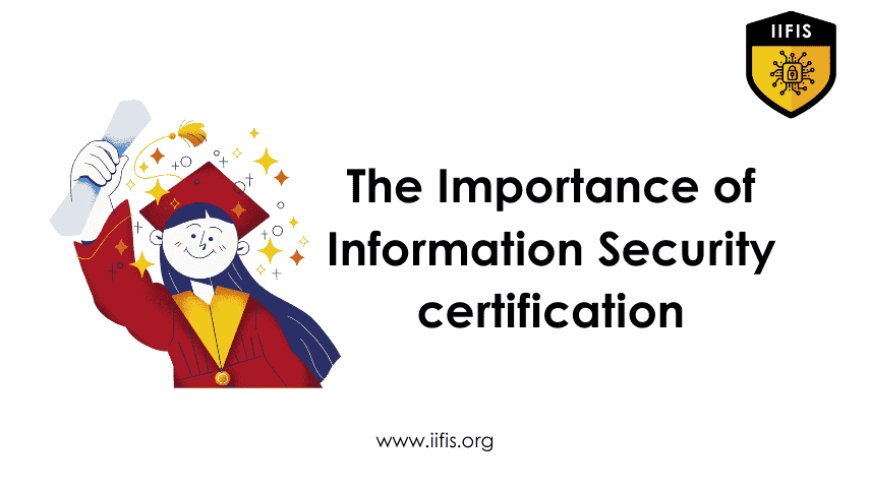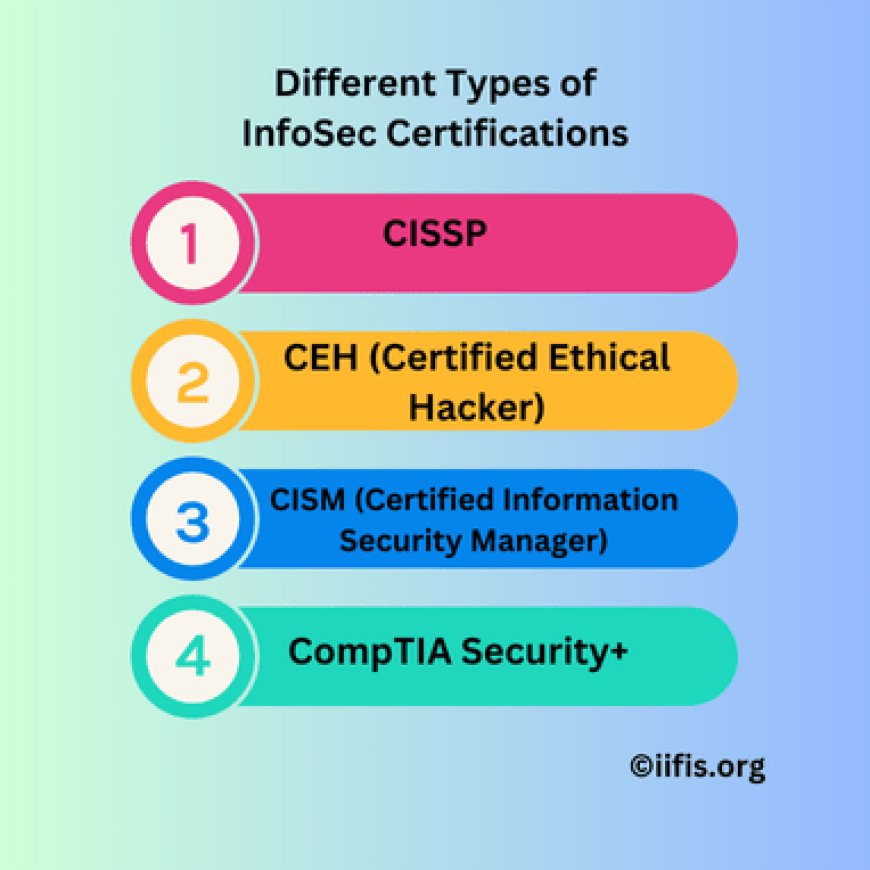Why Information Security Certification is Essential Today
Discover why InfoSec certification is essential in today's cybersecurity landscape. Learn how it validates skills, supports career growth, and strengthens organizational defenses against emerging threats.

In today’s increasingly digital world, cybersecurity threats are evolving at an unprecedented pace. Organizations of all sizes face constant risks from hackers, data breaches, and cyber-attacks, making the need for skilled information security professionals more crucial than ever. Earning an InfoSec certification has become a vital step for those looking to secure a career in this dynamic field. Not only does it validate your knowledge and skills, but it also sets you apart in a competitive job market, proving your commitment to staying current in a rapidly changing industry. In this blog, we'll explore why InfoSec certification is more essential today than ever before and how it can elevate your career.
The Growing Threat of Cybersecurity Breaches
Overview of Cyber Threats
Cyberattacks like ransomware, phishing, and data breaches have surged in recent years. Ransomware encrypts data for ransom, phishing steals sensitive info through deceptive emails, and data breaches expose personal or corporate data. The rise in remote work and IoT has expanded vulnerabilities for attackers to exploit.
Economic and Reputational Impact
Cyber incidents can cause massive financial losses and damage a company’s reputation. The average data breach in 2023 cost $4.45 million. Beyond direct costs like ransom payments and system recovery, businesses face long-term damage to customer trust, loss of business, and regulatory fines.
Statistics
Cybercrime costs: Estimated at $6 trillion in 2021, projected to hit $10.5 trillion by 2025.
Data breaches: U.S. breaches increased by 68% in 2021.
Ransomware: Attack frequency doubled in 2021, with ransom payments averaging $1 million by 2023.
Phishing: Involved in 36% of breaches in 2023.
Cybercrime is rising fast, making strong cybersecurity essential for all organizations.
What is an InfoSec Certification?
InfoSec certifications (Information Security certifications) are professional qualifications designed to validate an individual's skills and knowledge in cybersecurity. These certifications cover a range of topics, including network security, data protection, ethical hacking, risk management, and compliance with security regulations. By earning these credentials, professionals demonstrate their ability to protect organizations against cyber threats, manage security protocols, and respond to security incidents.
Different Types of InfoSec Certifications

CISSP (Certified Information Systems Security Professional)
CISSP is one of the most recognized certifications for experienced security professionals. It covers a broad range of topics, including risk management, security architecture, incident response, and software development security. CISSP is ideal for security managers, consultants, and analysts.
CEH (Certified Ethical Hacker)
CEH focuses on ethical hacking, teaching professionals how to think like a hacker in order to identify and fix security vulnerabilities. Topics include penetration testing, malware analysis, and network attack techniques. It is ideal for security analysts and penetration testers.
CISM (Certified Information Security Manager)
CISM is geared toward security management and governance. It emphasizes topics like risk management, security program development, and incident management. This certification is ideal for those in security leadership roles who manage an organization's information security framework.
CompTIA Security+
Security+ is an entry-level certification that covers foundational cybersecurity concepts, such as network security, cryptography, threat analysis, and compliance. It is well-suited for individuals starting their careers in IT security, including system administrators and network engineers.
These certifications help professionals develop specialized skills in various aspects of information security, making them essential for advancing in the field.
Why InfoSec Certification is Crucial for Professionals
Skill Validation:
InfoSec certifications provide formal proof of a professional's knowledge and competence in cybersecurity. They demonstrate that the individual has mastered essential skills like network security, data protection, and threat mitigation, which are vital in defending organizations from cyberattacks.
Career Advancement:
Certified professionals are highly regarded by employers and often have a competitive edge in the job market. Employers tend to prefer candidates with certifications because they bring verified expertise, making them more likely to get promotions or new job opportunities in cybersecurity roles.
Competitive Salary:
Certified InfoSec professionals typically earn higher salaries than their non-certified peers. Certifications like CISSP, CEH, and CISM signal advanced skills, leading to better job offers and salary packages. According to industry reports, certified cybersecurity experts can earn significantly more than their uncertified counterparts.
Staying Current:
Many InfoSec certifications require ongoing education or periodic recertification. This ensures that professionals stay up to date with the latest security trends, tools, and threats in a fast-evolving field, maintaining their relevance and effectiveness in the industry.
Why InfoSec Certification is Critical for Organizations
Building a Strong Security Culture:
Organizations that invest in InfoSec-certified staff foster a more security-conscious workplace. Certified employees bring a deep understanding of security protocols, which helps create a culture of vigilance, reducing human errors that often lead to breaches.
Compliance and Regulations:
Many industries, such as healthcare and finance, require InfoSec certifications to comply with strict regulations like GDPR, HIPAA, and CCPA. Certified professionals ensure that organizations adhere to legal standards, avoiding costly fines and legal consequences.
Reducing Risk of Breaches:
Certified cybersecurity professionals are better equipped to identify, prevent, and respond to threats, significantly lowering the risk of successful attacks. Their expertise in security best practices and risk management allows them to detect vulnerabilities and mitigate risks before they become major issues.
Client Trust:
Having a team of certified InfoSec professionals boosts an organization's reputation and credibility. It signals to clients and partners that the company is serious about safeguarding their sensitive information, which can enhance trust and improve business relationships.
The Future of InfoSec and Cybersecurity
Emerging Cyber Threats:
The rapid development of technologies like AI, IoT, and 5G is introducing new security vulnerabilities. AI can be used both defensively and offensively, with cybercriminals leveraging AI-driven attacks to bypass traditional defenses. The Internet of Things (IoT) expands the attack surface, as more devices are connected to networks, often with weak security. 5G technology will increase connectivity speeds and volumes, which can make securing these vast networks more challenging, as they can be exploited for high-speed attacks and data breaches.
Increasing Demand for Certified Professionals:
The growing complexity of cyber threats has led to a significant talent gap in cybersecurity. There are not enough qualified professionals to meet the rising demand for cybersecurity expertise. As businesses increasingly rely on digital solutions, the need for certified InfoSec professionals continues to rise, with many industries prioritizing certification to ensure that staff have the skills to defend against modern threats.
Evolving Certifications:
As cyber threats evolve, InfoSec certifications are also adapting to address future challenges. Certifications are increasingly incorporating training on AI-driven threats, cloud security, IoT security, and zero-trust architectures. Additionally, new areas such as quantum computing security and 5G-related vulnerabilities are being integrated into certification curriculums to ensure professionals are prepared for the cybersecurity landscape of tomorrow.
In today's increasingly complex threat landscape, InfoSec certification is no longer optional. With the rise of advanced technologies like AI, IoT, and 5G creating new vulnerabilities, organizations and professionals must stay ahead by ensuring they have the right skills to defend against evolving cyber threats. InfoSec certifications provide essential validation of skills, help fill the growing talent gap, and are crucial for maintaining compliance with industry regulations.
Whether you are an individual looking to advance your career or an organization aiming to strengthen your defenses, InfoSec certification is a key investment. Programs such as IIFIS (International Institute of Information Security) offer valuable training and certification pathways that equip professionals with the knowledge to combat today’s cyber challenges. Now is the time to consider InfoSec certification for personal growth and to bolster your organization’s cybersecurity resilience.























